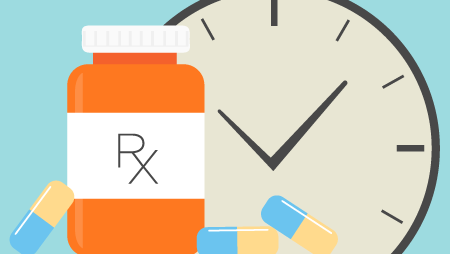When you pick up medication at the pharmacy, your pharmacist usually provides the information you need to know about your prescription, such as how and when to take it. Different medications have different instructions.
Sarah Rall, core line administrator for pharmacy operations, recommends keeping in mind three factors that may affect your body’s response to medications.
1. Consistency is key

Rall says medication works best when it’s taken consistently at the same time every day.
“The time you take it can depend on how well the drugs work and if there’s the risk of adverse side effects,” she said. “It can also be based on what time is convenient for you.”
2. At bedtime may be the best time
Rall said consider whether your medication works best at bedtime. Some cholesterol medications also are given at bedtime because they work more effectively.
Other medications should be taken at bedtime to avoid drowsiness or dizziness. If you take medicine like this, it should be consistently taken at night to avoid these kinds of side effects.
3. The food factor
Many types of medication require you to eat first.
“Taking medicine with food is probably a big one,” Rall said. “We do recommend taking medicine with food to reduce the risk of some adverse effects like nausea or an upset stomach.”
Taking medicine with food also can help with medication absorption. Generally, when taking medicine after eating, a little bit of food is enough.
“Crackers and toast work,” Rall said. “Sometimes even milk works. There are some medicines that work better with a larger amount of food. But generally, you don’t need a full meal to prevent stomach upset.”
A glass of water with medicine usually helps as well, unless the medication suggests you drink more.
Vice versa, some medicine works better on an empty stomach.
“The time to take medicine on an empty stomach is usually an hour before or two hours after a meal,” Rall said. “It can improve the effectiveness by waiting that period of time.”
Your pharmacist will typically make recommendations for your medication during pick-up time.
Other factors
When taking medicines like potassium or alendronate, Rall suggests sitting or remaining upright for 30 minutes. This positioning keeps the medicine from slowing down in your esophagus and causing irritation.
When taking medication, also think about the vitamins or supplements you take. Some medicine can be greatly affected by vitamins, calcium and iron.
If you have any questions about medications you’re taking including what time you should take them, contact your provider or pharmacist.






Leave a Reply